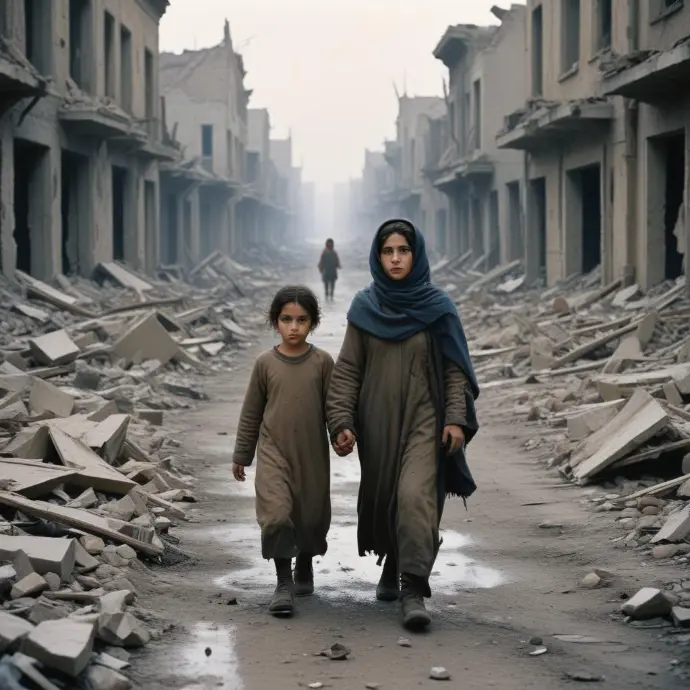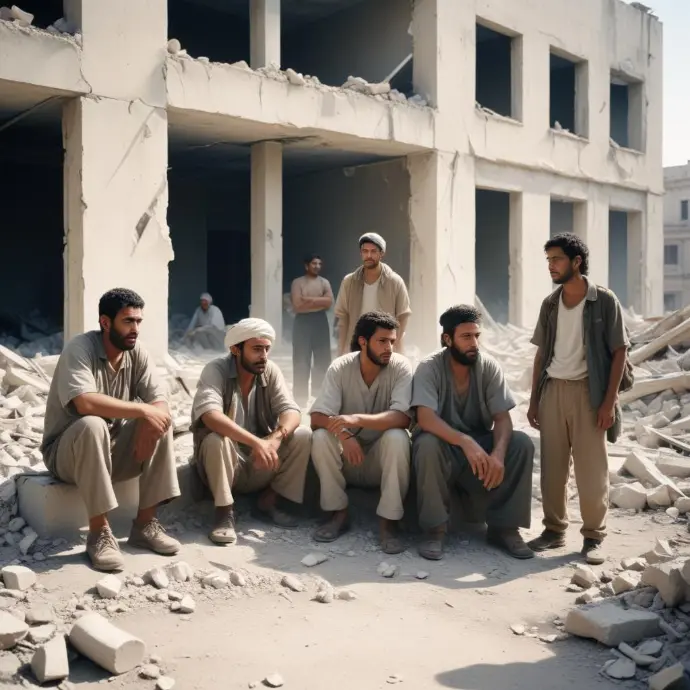
International Treaties and Their Impact on the Resolution of Armed Conflicts
In our "Rights in Armed Conflict" category, you will find an exhaustive analysis of the impact of international treaties on the resolution of armed conflicts. Discover how these agreements influence the protection of human rights in conflict situations. Join us on this fascinating exploration and discover how a more just world is built for all!
Keep reading and discover more information about Rights in Armed Conflict More informationIntroduction
In the context of armed conflicts, international treaties play a crucial role in the protection and promotion of human rights. These agreements represent a legal framework that seeks to regulate the actions of States and other actors involved in conflict situations, with the aim of minimizing human suffering and preserving the dignity of those affected by armed violence.
International treaties, also known as international conventions or agreements, are legal instruments that establish obligations and responsibilities for the states that ratify them. In the context of armed conflict, these treaties seek to regulate the use of force, protect persons not directly participating in hostilities, and ensure respect for humanitarian law and human rights in general.
A prominent example of an international treaty in this area is the Geneva Convention, which establishes standards for the protection of victims of armed conflict, including the wounded, sick, prisoners of war, and civilians. These types of agreements seek to limit the impact of war on the civilian population and those not participating in hostilities, protecting their lives and their physical and psychological integrity.
International treaties in the context of armed conflict are essential for promoting respect for human rights and international humanitarian law, establishing clear standards that states commit to comply with, even in the midst of conflict situations.
The importance of international treaties in the resolution of armed conflicts lies in their ability to establish common standards that regulate the behavior of States and other actors involved in conflicts. These agreements seek to mitigate the impact of war on the civilian population by protecting people not participating in hostilities and establishing clear limits on the use of force and weapons.
Furthermore, international treaties promote accountability and justice by establishing legal responsibilities for those who violate humanitarian norms and human rights in the context of armed conflict. These agreements also address the protection of vulnerable groups, such as children, women, and persons with disabilities, by providing a legal framework for their protection and assistance.
International treaties play a fundamental role in the pursuit of peace and the resolution of armed conflicts by promoting respect for human rights and international humanitarian law and by establishing clear responsibilities for actors involved in conflict situations.
The history of international treaties in the context of armed conflicts dates back to efforts to regulate the conduct of States in times of war and protect people affected by armed violence. The development of international humanitarian law has been fundamental in this process, with the adoption of treaties and conventions that seek to limit human suffering in conflict situations.
A significant milestone in the evolution of international treaties in armed conflicts is the adoption of the Geneva Conventions in 1949, which established clear standards for the protection of people affected by armed conflicts. These conventions have been complemented by additional agreements and protocols that seek to strengthen the protection of civilians, the wounded, the sick, and prisoners of war, as well as prevent certain practices, such as the use of chemical or biological weapons.
Over the decades, the international community has continued to develop and strengthen international treaties related to armed conflicts, adapting them to the changing challenges and realities of modern warfare. These efforts reflect the international community's commitment to protecting human rights in conflict situations, demonstrating the continued importance and relevance of international treaties in promoting peace and resolving armed conflicts globally.

Impact of International Treaties on the Resolution of Armed Conflicts
International treaties have played a fundamental role in the resolution of armed conflicts around the world. The implementation of these treaties has been crucial in establishing common norms and standards that seek to protect human rights in conflict situations. In this regard, international treaties have helped lay the groundwork for the protection of civilians, the regulation of the use of weapons, and the promotion of peace in contexts of armed conflict. The implementation of international treaties in recent armed conflicts has demonstrated their relevance in the protection of civilians, particularly with regard to the prevention of atrocities and serious human rights violations. These treaties have provided a legal framework that seeks to limit the impact of armed conflict on the civilian population, establishing clear standards on the treatment of prisoners, the protection of civilians, and humanitarian assistance in conflict zones. Furthermore, the implementation of international treaties has contributed to the accountability of actors involved in armed conflicts, laying the groundwork for the investigation and prosecution of war crimes and human rights violations. In this regard, international treaties have strengthened the legal framework for the prosecution of those responsible for serious violations, contributing to justice and reparation for victims.
International treaties have provided significant benefits in the resolution of armed conflicts by establishing norms and principles that seek to protect civilians, regulate the use of weapons, and promote peace. However, they also present certain limitations in their application and effectiveness, especially in contexts where the actors involved in the conflict do not respect international humanitarian law.
Among the most notable benefits of international treaties in the resolution of armed conflicts is the creation of a legal framework that seeks to protect civilians, limit the impact of hostilities, and promote humanitarian assistance in conflict zones. Furthermore, these treaties have contributed to the prevention of war crimes and human rights violations, laying the groundwork for accountability and justice for victims.
However, the limitations in the application of international treaties in the resolution of armed conflicts are primarily evident when the actors involved do not respect international humanitarian law, ignoring the norms and principles established in those treaties. This lack of compliance compromises the effectiveness of treaties and hinders their implementation in contexts of armed conflict, which can result in greater suffering for civilians and impunity for those responsible for serious violations.
When analyzing the impact of international treaties on different armed conflicts, it is possible to identify significant differences in their implementation and effectiveness, depending on the specific context of each conflict. In some cases, the implementation of certain treaties has had a positive impact on the protection of civilians and the promotion of peace, while in other conflicts, the effectiveness of treaties has been limited due to a lack of compliance by the actors involved.
For example, in the context of the conflict in Syria, the implementation of international treaties has faced significant challenges due to the complexity of the conflict and the presence of multiple armed actors with divergent interests. This has hindered the protection of civilians and led to serious human rights violations, despite the existence of an international legal framework that seeks to regulate armed conflict.
On the other hand, in the case of Colombia, the implementation of international treaties has significantly contributed to the construction of a peace process, laying the foundations for the demobilization of armed groups and the protection of victims' rights. In this sense, international treaties have had a positive impact on the resolution of the armed conflict in Colombia, promoting reconciliation and transitional justice.
The effective implementation of international treaties in armed conflicts currently faces various challenges. One of the main obstacles lies in the lack of political will of certain countries to adhere to these agreements or to comply with the obligations imposed by the treaties. This lack of political commitment hinders the implementation and enforcement of international norms aimed at protecting populations affected by armed conflict.
Another important challenge relates to the difficulty of monitoring and enforcing international treaties in conflict settings. The presence of non-state armed groups, the lack of effective control over certain regions, and the absence of adequate implementation and monitoring mechanisms make it difficult to ensure that treaty provisions are effectively enforced by all parties involved in the conflict.
Furthermore, the increasing complexity of armed conflicts, which often involve non-state actors, ethnic disputes, geopolitical interests, and natural resources, poses additional challenges for the implementation of international treaties. Adapting legal and regulatory frameworks to these changing realities is critical to ensuring that treaties are effective in protecting human rights and promoting peace in contexts of armed conflict.

Relationship between International Treaties and Human Rights in Armed Conflicts
International treaties play a fundamental role in the protection of human rights during armed conflicts. These agreements establish standards and obligations that states must comply with, even in situations of conflict. By ratifying these treaties, countries commit to respect, protect, and guarantee the human rights of all people, regardless of their situation. The signing of international treaties such as the Geneva Conventions and their Additional Protocols, the Convention on the Rights of the Child, and the Convention against Torture, among others, establishes a legal framework that seeks to safeguard the integrity and dignity of people affected by armed conflicts. These legal instruments contribute to promoting respect for international humanitarian law and human rights, limiting human suffering in times of war. Furthermore, international treaties promote accountability and responsibility of actors involved in armed conflicts by establishing monitoring and reporting mechanisms that seek to prevent human rights abuses and violations.
International treaties exert a significant influence on the prevention of human rights violations in armed conflicts. By establishing clear standards and legal obligations for states, these agreements seek to deter and prevent the commission of abuses against the civilian population, including war crimes, torture, forced displacement, and the recruitment of child soldiers, among others.
Furthermore, international treaties contribute to strengthening the global human rights protection system by promoting cooperation among states, international organizations, and civil society to monitor, report, and advocate for respect for human rights in contexts of armed conflict.
The existence of complaint, investigation, and sanction mechanisms within the framework of international treaties, such as periodic reports before committees of experts and individual complaint mechanisms, provides victims of human rights violations in armed conflicts with the opportunity to seek justice and reparation for the harm they have suffered.
A clear example of the impact of international treaties on the protection of human rights in armed conflicts is the implementation of the Geneva Conventions in war situations. These treaties have been instrumental in establishing humanitarian standards and protecting people not directly involved in hostilities, such as the wounded, sick, and civilians, as well as prisoners of war.
Another relevant case is the role of the Convention on the Rights of the Child in preventing the recruitment and use of children in armed conflict. This treaty has contributed to raising awareness about the vulnerability of children in war situations and promoting measures for their protection and reintegration into society.
These examples illustrate how international treaties have had a direct impact on the protection of human rights in contexts of armed conflict, demonstrating their relevance in promoting peace, justice, and respect for human dignity.
The Role of International Organizations in the Implementation of International Treaties in Armed Conflicts
International organizations play a crucial role in the implementation of international treaties in armed conflicts. Among their functions and responsibilities is monitoring Member States' compliance with the treaties. This entails comprehensively monitoring human rights violations, as well as the agreements established in international treaties. Furthermore, these organizations are responsible for providing technical assistance and training to local actors to ensure the proper implementation of treaties in contexts of armed conflict.
International organizations also have the role of investigating and documenting violations of international treaties in situations of armed conflict, which contributes to accountability and the pursuit of justice for victims. This work involves gathering evidence, testimonies, and data that serve as a basis for legal action and reparation measures.
Furthermore, these organizations play a crucial role in promoting cooperation among Member States, encouraging dialogue and negotiation as avenues for resolving armed conflicts. Through diplomacy and mediation, they seek to facilitate agreements that respect international treaties and promote the protection of human rights in conflict contexts.
Collaboration between international organizations and local actors is critical for the effective implementation of international treaties in armed conflicts. International organizations often work closely with non-governmental organizations (NGOs) and community groups to ensure that the needs and concerns of affected communities are taken into account in treaty implementation.
This collaboration involves consultations and the active participation of local actors in the planning and implementation of programs and measures aimed at complying with international treaties. Furthermore, international organizations often support capacity building and the training of local leaders so they can advocate for respect for treaties and the protection of human rights in their communities.
Furthermore, collaboration between international organizations and local actors focuses on awareness-raising and education about human rights and international treaties, seeking to empower communities so they can demand compliance with these agreements and actively participate in their implementation.
Despite the important role of international organizations, several challenges hinder the full implementation of international treaties in armed conflicts. One of the most significant challenges is the lack of resources and capacities, which limits these organizations' ability to carry out their monitoring, technical assistance, and documentation of violations functions.
Furthermore, the lack of access to conflict zones and the lack of cooperation from the actors involved hinder the work of international organizations. This highlights the need to strengthen protection and security mechanisms for humanitarian and human rights personnel operating in contexts of armed conflict.
Overcoming these challenges requires greater cooperation and support from the international community, as well as strengthening alliances with local and regional organizations. Likewise, it is essential to promote and defend international treaties at the global level, seeking the commitment of Member States and civil society to the protection of human rights in situations of armed conflict.
Conclusions
International treaties play a crucial role in the resolution of armed conflicts, as they establish norms and principles that seek to protect and promote human rights in conflict situations. Their current and future impact is significant, as they provide a legal framework that guides the actions of States and parties to the conflict, contributing to the mitigation of human suffering and the construction of peace.
The ratification and compliance of international treaties by States are fundamental to their effectiveness. As more countries adhere to these agreements, the protection of human rights in contexts of armed conflict is strengthened, laying the foundation for greater justice and stability globally.
It is crucial to recognize that, while international treaties are powerful tools, their real impact depends on political will and international cooperation. Therefore, it is necessary to promote continued commitment to these agreements and strengthen monitoring and accountability mechanisms to ensure their effective implementation in the resolution of armed conflicts.
Final Considerations on the Importance of International Treaties in the Protection of Human Rights in Contexts of Armed Conflict
Ultimately, international treaties represent a significant advance in the protection of human rights in situations of armed conflict. Their impact is reflected in the promotion of universal values, the prevention of egregious violations, and the construction of an environment conducive to reconciliation and lasting peace. As the international community continues to strengthen and implement these agreements, we can move toward a world where human rights are respected and protected, even in the most difficult times.

 IHRO NEWS
IHRO NEWS